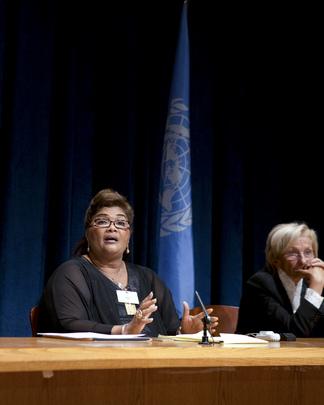MINURCAT: An Honorable Exit?
After only two years of deployment, the UN Mission in the Central African Republic and Chad (MINURCAT) will, at the request of the Government of Chad, start its drawdown and exit by 31 December this year. MINURCAT will hand over its main tasks to Chad and the UN agencies present. These responsibilities include security of refugees, IDPs and humanitarian workers in eastern Chad, and continued support to the 850-strong Chadian police/gendarme force, the Détachment Intégré de Securité (DIS), established to provide physical protection in eastern Chad, so far trained and mentored by MINURCAT.
A new report from the Norwegian Institute of International Affairs examines the situation of sexual and gender-based violence (SGBV) against refugees and internally displaced persons (IDPs) in eastern Chad, and responses of the MINURCAT and other UN agencies. It also discusses the implications for the exit of MINURCAT, with termination scheduled for 31 December 2010, and for early recovery initiatives, as well as the prospects of protection measures provided by the government of Chad.
As with any other country, it is difficult to gauge the exact extent of SGBV committed against civilians in Chad. However, SGBV is high on the agenda and a cross-cutting issue for various sectors in MINURCAT and humanitarian agencies. SGBV appears to have been used as a part of a deliberate conflict tactic, with women being attacked once they leave camps to fetch firewood, water etc. On the other hand, many of the reported cases of SGBV are committed inside the camps by family members and neighbours. A central focus of the fight against SGBV has been to sensitize the targeted population, refugees and IDPs to harmful customary practices and human rights violations as preventive measures, as well as to encourage victims to report SGBV and other violations. This work has been especially important for the various gender and women’s committees in the refugee camps. Other main activities have been area security and facilitating returns for the displaced population, provided by MINURCAT and its partners to ensure the protection of civilians.
A major achievement has been to establish the national community policing, Détachement Intégré de Sécurité (DIS). The DIS is responsible for maintaining the rule of law in refugee and IDP camps and key towns within a 10 km radius. Members of the DIS have been trained in gender issues, and all its units have a gender focal point. Throughout our field visit, however, we were told that the important work of the DIS was being hampered by a dysfunctional judicial system, as well as a substantive lack of material and personnel capacity. Furthermore, SGBV victims who report their cases to DIS are vulnerable to reprisals and stigmatization from their communities, so it was proposed that victims should be offered protection in a safe house next to the DIS compound within 24 to 72 hours of filing a report.
Notwithstanding the important advances, the Chadian government, weary of repeated promises of construction of airport aprons and hard-wall commissariats for the DIS, early this year asked the mission to leave. President Déby announced that the mission had been a failure, unable to fulfil its promises, and that the Government of Chad was ready to take over responsibility for the security of refugees, IDPs and humanitarian workers. UNSC Resolution 1926 of 26 May 2010 outlines how Chad will assume responsibility for the protection of civilians. Indeed, the commitment that Chad is showing through the detailed plan is unprecedented. The Government of Chad has committed to:
(i) ensure the security and protection of civilians in danger, particularly refugees and internally displaced persons;
(ii) facilitate the delivery of humanitarian aid and the free movement of humanitarian personnel by improving security in eastern Chad;
(iii) ensure the security and freedom of movement of MINURCAT staff and United Nations and associated personnel.
This is a laudable step on the part of the Chadian government. There have been far too many instances where host governments feel no obligation to present their plans for the protection of civilians to the international community. However, the extent of the tasks given to the DIS is worrisome: “˜… to provide security inside and around refugee camps and IDP sites, security escorts and area security, in coordination with the Gendarmerie and the Nomad Guard.’ Firstly, this expands the area of DIS operations from refugee camps to include IDP sites in general. Secondly, it gives the DIS responsibility for area security as well, in coordination with the Gendarmerie and the Garde Nationale et Nomade du Tchad (GNNT) – who are sorely lacking in capacity and are ill-informed as to how to execute a protection mandate. While the plan is praiseworthy, what is less clear is whether it is realistic. Lacking are arrangements for how the other protection measures, such as strengthening of the judicial apparatus, human rights monitoring and intercommunity dialogue efforts – currently undertaken by MINURCAT should be transferred to the Government of Chad, UN agencies and NGOs. There is a high risk that eastern Chad, which was on its way to early recovery, may again become a humanitarian crisis. The key benchmark – the return of a critical mass of IDPs – had been within striking distance. It now seems an elusive goal.






